Boko Haram has said it is building an Islamic state that will revive the glory days of northern Nigeria's medieval Muslim empires.
However, for those in its territory life is a litany of killings, kidnappings, hunger and economic collapse.
The Islamist group's five-year campaign has become one of the deadliest in the world.
It has killed thousands in bomb attacks and gun attacks across the country.
Around 10,000 people were killed last year alone, according to the Council on Foreign Relations.
Hundreds, mostly women and children, have been kidnapped, notably when it seized 276 schoolgirls at a school in Chibok in April last year.
More than 230 are still missing despite an international campaign for their safe return.
The Islamist group was founded in 2002 by cleric Mohammed Yusuf.
It began military operations in 2009 with the aim of overthrowing the government and creating an Islamic state.
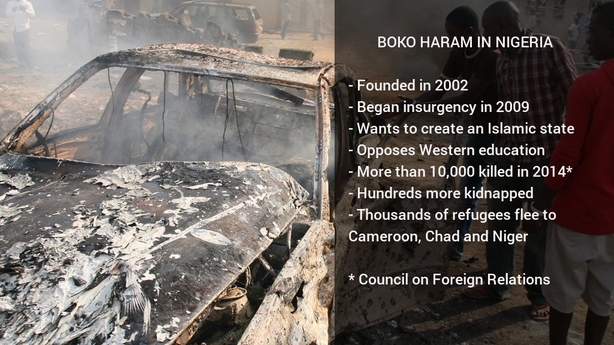
Boko Haram loosely translates as 'Western education is forbidden' and Yusuf set up a religious school in the northern city of Maiduguri alongside a mosque.
It also promotes a version of Islam that forbids Muslims to take part in political or social activities that are associated with Western society.
Yusuf was killed in police custody in 2009 and succeeded by Abubakar Shekau.
He was reportedly killed in August 2014, but a man claiming to be him has appeared in a number of online videos since then.
Threat to economic stability
Boko Haram remains the biggest threat to the stability of Africa's biggest economy ahead of a vote on 14 February in which President Goodluck Jonathan will seek re-election.
But while it has matched Islamic State in Syria and Iraq in its brutality - it beheads its enemies on camera - it has seriously lagged in the more mundane business of state building.
"The Islamic state is a figment of their imagination. They are just going into your house and saying they have taken over," said Phineas Elisha, government spokesman for Adamawa state, one of three states under emergency rule to fight the insurgency.
Unlike its Middle East counterparts wooing locals with a semblance of administration, villagers trapped by Boko Haram face food shortages, slavery, killing and a lock down on economic activity, those who escaped say.
"(They) have no form of government," said Mr Elisha, who saw the devastation caused by Boko Haram after government forces recaptured the town of Mubi in November.
Boko Haram, which never talks to media except to deliver jihadist videos to local journalists, could not be reached for comment.
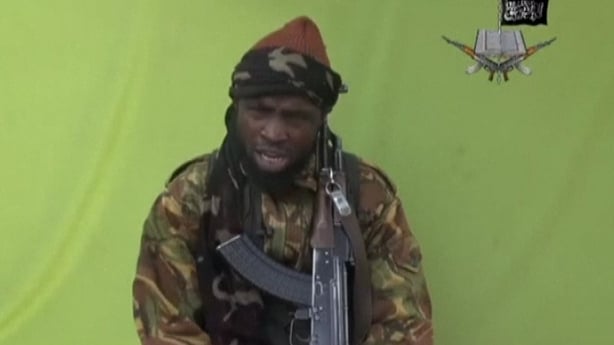
Talk of reviving Islamic empires
Boko Haram's leaders talk about reviving one of the west African Islamic empires that for centuries prospered off the Saharan trade in slaves, ivory and gold, but they demonstrate little evidence of state building.
In August, a man saying he was Boko Haram leader Shekau (above) issued a video declaring a "Muslim territory" in Gwoza, by the Cameroon border.
There were echoes of Islamic State's proclaimed caliphate in Iraq and Syria two months earlier.
Boko Haram controls an area just over 30,000sq.km of territory, about the size of Belgium, according to a Reuters calculation based on security sources and government data.
But while in Syria, after initially brutal takeovers, IS has tried to win over communities, those who escaped Boko Haram say the rebels do little for them beyond forcing them to adopt their brand of Islam on pain of death.
"They provide raw rice to cook, the rice that they stole from the shops. They provide a kettle and ... scarves to cover up the women," said Maryam Peter from Pambla village.
"People are going hungry. They are only feeding on corn and squash. No meat, nothing like that. The insurgents are not providing anything else," she added.
Maryam said most daily interactions with the militants involved them questioning villagers on their movements and forbidding them from trying to escape, a rule she managed to flout when she fled a week ago.
A government-run camp in a former school is now her home, along with 1,000 others, where mothers cook on outdoor fires while children run around.
Some 1.5 million people have been rendered homeless by the war, Oxfam says.
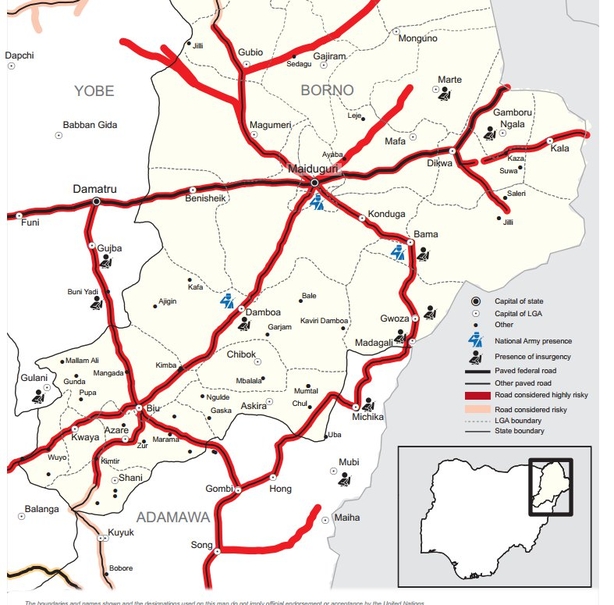
Refugees go without food and water
And those the militants kill, they often fail to bury.
The first thing the Nigerian Red Cross has to do when a town falls back into government hands is clear the corpses, said Red Cross official Aliyu Maikano.
After the army recaptured Mubi in November, Mr Maikano had to cover his nose to avoid the stench of rotting corpses.
Those still alive "were starved for food, water, almost everything there. There's no drinking water because (in) most of the wells there you'll find dead bodies," Mr Maikano said.
Many residents looked tattered and malnourished, and some were unable to speak.
"They are heartless. ISIS (Islamic State) is a kind of organised group, it's a business. These guys are not," he said.
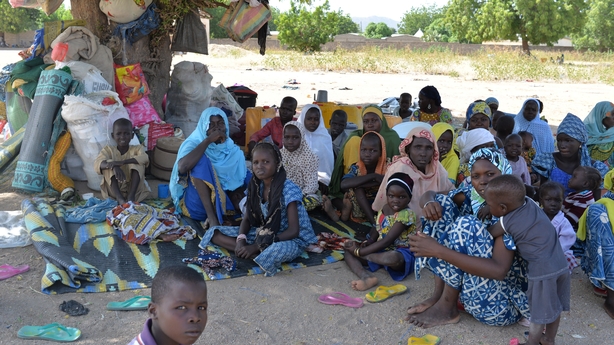
A former resident of Mubi said the rebels had renamed the town "Madinatul Islam" or "City of Islam".
But when Mr Elisha walked into the Emir's palace after its recapture, everything had been looted, even the windows and doors.
"Mubi was a ghost town ... Virtually all the shops were looted." he said. It took him hours to find a bottle of water.
Sometimes the rebels simply loot the unprotected villages and hide out in bush camps, security sources say.
Murna Philip, who escaped the occupied town of Michika five months ago, said a few dozen fighters had occupied an abattoir, a school and a lodge, but little else.
To survive under their watch you have to pretend to support them, said Andrew Miyanda (below), who escaped the rebels last week, walking for days to the Benue river.
"They would write Jama'atu Ahlis Sunna Lidda' Awati Wal-Jihad (Boko Haram's full name) on their trouser legs in marker or the back of their shirts," he said.
"You had to turn up your trousers with the marker on to show that you are a member."
Buildings were torched and boys were abducted for "training", he said, a practice reminiscent of Uganda's Lord's Resistance Army.
Slowly, with the help of traditional hunters armed with home-made guns and a reputation for magic powers, government forces have pushed Boko Haram out of some of its southern possessions.
Morris Enoch, a leader of the hunters, says they found an arsenal of military weapons: rocket launchers, machine guns, dynamite, anti-aircraft guns and grenades.
The rebels rarely leave behind much else.
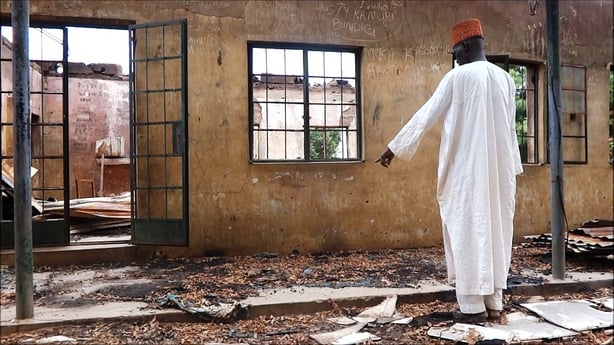
Attacks and condemnation
The United Nations has condemned the latest spate of attacks carried out by Boko Haram since the turn of the year.
Militants attacked and destroyed at least 16 villages and towns around Baga in Borno state earlier this month.
The government said more than 150 people were killed, but there are unconfirmed reports that as many as 2,000 people may have been killed.
Satellite imagery showed the widespread destruction in the area.
The Office of the High Commissioner for Human Rights has said it "deeply deplored the vicious, ruthless attacks against civilians".
The UN Office for the Coordination of Humanitarian Affairs said at least 3,400 Baga residents had fled to Chad after the attacks.
The group was also widely condemned for using girls, possibly as young as ten, in suicide bomb attacks at markets in Yobo state.
UNICEF Executive Director Anthony Lake said: "Words alone can neither express our outrage nor ease the agony of all those suffering from the constant violence in northern Nigeria."
Meanwhile, the International Red Cross has said it has seen a significant deterioration in the humanitarian situation in the northeast of Nigeria.
It said that thousands have fled their homes and have sought refuge in safe havens in neighbouring states.

